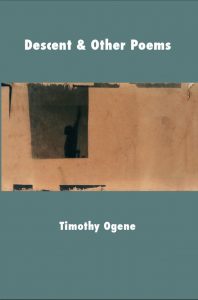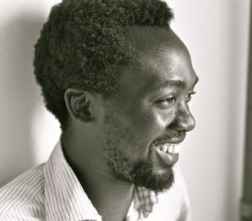
Descent & Other Poems
by Timoty Ogene
ISBN: 9780997505108
6 x 9; $16.95
Descent & Other Poems was chosen by Felicity Plunkett for the Australian Book Reveiw list of Books of the Year, 2016. On the ABR page, scroll down to find Felicity Plunkett's quote, "Nigerian-born Timothy Ogene’s Descent and Other Poems examines love, doubt, solitude and migration in attentive, luminous poems."
While Descent & Other Poems was not the winner of the 2017 Glenna Luschei Prize for African Poetry, judge John Keene made an honorable mention, saying, "Timothy Ogene’s debut collection, Descent & Other Poems, presents a lyric and emotional journey that swiftly and utterly captures the reader’s eye and heart.”
Lithub.com (Literary Hub) listed Descent & Other Poems in its FAVORITE POETRY COLLECTIONS OF 2017
From the back cover:
Timothy Ogene’s poems are writings of witness, displacement and beauty. Instead of a home address there are poems as address, at once exquisitely gentle and acute. The sharpness of the poems’ blades—whether literal, like the blades that peel cassavas and leave the speaker’s arms scarred, or deeper injuries of trauma and loss—sits alongside their subtlety and tenderness. These are poems of deep attentiveness to the smallest encounters, and to the largest questions of love, doubt, solitude and migration. Their crafting reveals Ogene’s deep reading, both of poetry and of the and landscapes the poems explore. How do poems that bear witness to violence, loss and displacement open so gently to the reader? This paradox is one of many in these wise, important poems. I am reminded of Hélène Cixous’s description of Paul Celan’s poetry as ‘writing that speaks of and through disaster such that disaster and desert become author or spring’. Where trees hold ‘time in absent leaves’, these poems mourn roots but refrain from ‘easy paths’, offering, instead, the force and grace of a numinous poetics.
—Felicity Plunkett
"Where does he come from, Timothy Ogene? From Nigeria, from Liberia, from Texas, from Oxford, now Boston. But look for him in the future, where he will be writing great books. Look for him in the present, too, in this satisfying, wonderful book--already he can do everything--he makes music, his figurative language is rare in that it goes deep, is never arbitrary, there is a care for especially the poor people and objects of this world, he remains hidden behind his language yet clear, which is to say his ego does not control the writing, something else does--a desire to lead us gently to noticing. Not just noticing, experiencing. Suddenly an empty bench comes to the forefront of our sight, from the "remains" of fog. He can personify without anthropomorphizing, maybe because he loves the world without needing to hold on to any aspect of it. He is unusually free yet aware of the limitations imposed on us politically and yes by language itself. If you want some pleasure, slow down and listen to his poems."
—Ruth Lepson
Timothy Ogene was born in Nigeria, but has since lived in Liberia, Germany, the US, and the UK. His poems and stories have appeared in Numero Cinq, One Throne Magazine, Poetry Quarterly, Tahoma Literary Review, The Missing Slate, Stirring, Kin Poetry Journal, Mad Swirl, Blue Rock Review, aaduna, and other places. He holds a first degree in English and History from St. Edward’s University, and a Master of Studies in World Literatures in English from the University of Oxford. His first novel, The Day Ends Like Any Day, is scheduled for publication in April 2017.
Here is a preview of Timothy's book brought to you by issuu.com
